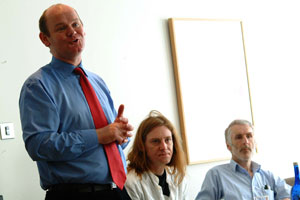15 March 2007 Edition
Drugs crisis - supporting the community response

Daithí Doolan, Rory McAuliffe from UISCE and Dr Paul Quigley
BY MICHAEL CARRCommunity workers and representatives of local organisations from across Dublin joined Sinn Féin activists and elected representatives at a Sinn Féin organised conference on the drugs crisis on Monday, 12 March.
Various sessions of the conference in Dublin’s Clarion Hotel dealt with the issues of drugs prevention and education, treatment and rehabilitation, innovative responses, and supply and control.
Mary Lou McDonald MEP, who gave the opening address, said the drugs problem should be a major issue in the forthcoming general election.
The first session, on Drugs Prevention and Education chaired by Joanne Spain, heard the Dublin Mid West candidate spoke of her own experience of growing up in Darndale and of how the drugs issue tore communities apart.
Donnachadh Hurley of Ballymun Regional Youth Resource, one of the largest professional youth work groups in the country, talked about the importance of youth work. The main issue, according to Donnachadh, isn’t keeping kids off the streets but rather increasing their self-confidence and building up a trust with youths in the area. “People who are well in themselves don’t do drugs,” he said. This session was also addressed by Dublin City Councillor Larry O’Toole, who spoke about the drug problem in Dublin North East.
Evidence-based solutions
The second session, Treatment and Rehab: Innovative Responses, was chaired by another City Councillor, Daithí Doolan. Rory McAuliffe of the Union for Improved Services, Communication and Education (Uisce), which represents drug users, spoke of the need for evidence-based solutions to the drugs problem and said that it was time to get beyond emotional debate.Dr Paul Quigley, an addiction specialist working in Ballymun, said that sanctions don’t work. He discussed the methadone programme in Dublin and the advantages of keeping people on methadone as opposed to heroin – for example, the HIV risk is much higher in the US because of the lack of methadone there. He also said that prisons aren’t the answer to the drugs problem.
Councillor Christy Burke talked about the history of the problem in the North Inner City, particularly in the 1980s while Joe Dowling of ICON spoke of the need to put drugs on the agenda for the next election and said that the problem is only going to get worse.
Councillor Nicky Kehoe spoke about his own role in addressing the problem in Cabra.
The final session of the meeting, Supply and Control, chaired by Larry O’Toole heard Rick Lines of the Irish Penal Reform Trust criticise the policies of Minister for Justice Michael McDowell, saying that the Minister seems intent on following approaches that have failed in both the US and Britain rather than using methods that have worked in other countries.
Aengus Ó Snodaigh TD spoke of the need for a “multifaceted” approach to the problem. He called for improved education and more treatment facilities, and said that the issue is the top issue for many communities.
It was apparent that in many working class areas across Dublin, this is a major issue which successive governments have failed to address. There was a clear consensus that it needs to be tackled before the problem gets worse.
